An Insider's Guide to "Being Julian Assange" Part 4
Yes, Aaron Swartz worked with WikiLeaks. Yes, SecureDrop was inspired by WikiLeaks. Here's the proof. My Steemit series of "Being Julian Assange" continues, with additional new content and insights. Enjoy!

Hi everyone!
It's that time: Another piece of the 'Being Julian Assange' puzzle, served piping hot. I'm so sorry it took so long but Steemit has been down in Moscow, along with a host of other sites :(
In the last part of this series we looked into the true history of WikiLeaks' support for whistleblower Chelsea Manning and the way in which it has been altered by interested parties. This week we peel back some common distortions about beloved internet hero Aaron Swartz; his work for WikiLeaks and his invention of SecureDrop.
You can check out Part 1 of this series here and Part 2 here and Part 3 here if you missed them.
As with the other parts, my comments and annotations appear in italics and brackets, after the below text.
Without further adieu, here is Part Four:
Being Julian Assange: Part Four
Includes Sub-sections:
- The Mic Drop
- Rewriting History
- The Forgotten History
Linguistics:
The Mic Drop
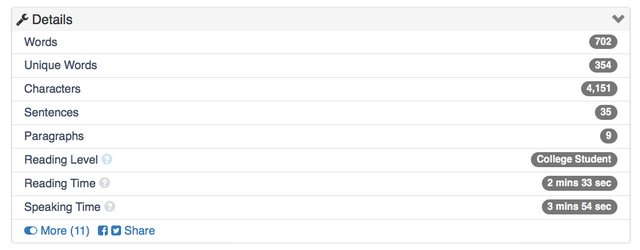
Rewriting History
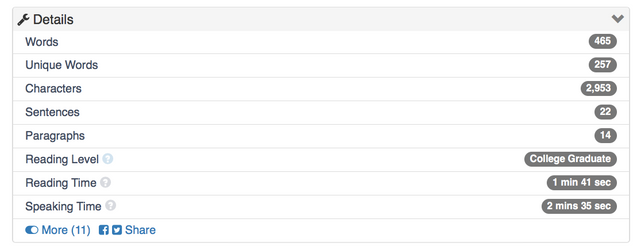
The Forgotten History
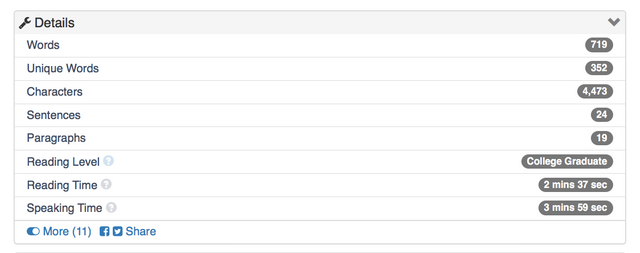
The Mic Drop
The attempts to posthumously divorce the highly-skilled developer Aaron Swartz and his (now known as) SecureDrop project from Assange, has been an extremely public one.
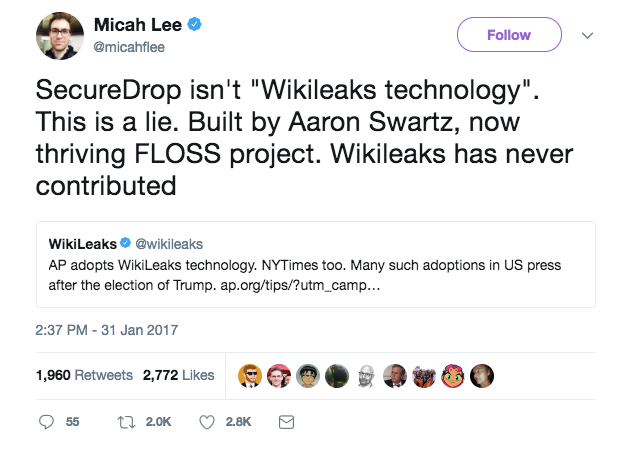
Backtrack a few years before Micah Lee's above assertion, and you'll find Freedom of the Press Foundation's own marketing materials promoted SecureDrop as - wait for it - "A WikiLeaks In Every Newsroom" - titling the launch video for the technology as precisely that.
The opening salvo from the host at their launch event reiterated the point: "This is SecureDrop - a Wikileaks in every newsroom... Freedom of the Press Foundation is a non-profit that was founded in December of 2012. It was originally created as a fancy way of laundering money for WikiLeaks but now it has expanded its scope..."
There was originally no bone of contention about it: WikiLeaks was the inspiration behind the invention of SecureDrop and was the primary beneficiary of the Foundation.
Right up until December 2016, the default tweet generated when donating to the Freedom of the Press Foundation read "I'm supporting uncompromising journalism like @WikiLeaks. Join me and @FreedomofPress in changing the world! Freedom.press"
Even the surviving beneficiaries of SecureDrop, namely Lamo-confidante Kevin Poulsen, and by association, developer Micah Lee (now so keen to sever the concept from its WikiLeaks roots) were originally candid about its genesis.
Micah Lee openly stated that SecureDrop - who acquired the Github repository of Swartz's pre-existing project known as DeadDrop, then rebranded it - was a way of making WikiLeaks-like tech available to everyone:
"When I first heard about DeadDrop, it seemed like a really fine, exciting project. WikiLeaks was really big in the news then and it seemed like it was kind of democratising that." Micah Lee
This is consistent with Kevin Poulsen's statement that he wanted to standardise the secure drop box technology across all newsrooms:
"There was no standard way for sources to contribute securely tips and documents to a reporter so I wanted to develop a solution and I went to approach Aaron..." Kevin Poulsen
In the wake of the Wall Street Journal's 2011 attempt to create a secure dropbox, Aaron Swartz was asked on live television "Do you think that WikiLeaks has really changed the playing field over the last year, now we're seeing this journalism arms race as to who can set up their own leaking site, or I guess alternative, faster?"
He answered: "Oh, clearly, I mean this is a huge vindication for WikiLeaks. We've gone from everybody saying that they should be locked up in prison, to the point where every newspaper and news outlet wants to have their own WikiLeaks site." (emphasis added)
The facts of the matter couldn't be any more clear: just as Aaron says, WikiLeaks was the reason that news rooms wanted access to the same technology. Just as Micah said, SecureDrop would bring WikiLeaks technology to the world. Just as Kevin Poulsen described in the New Yorker, he needed Aaron to do it, and accessed him via James Dolan.
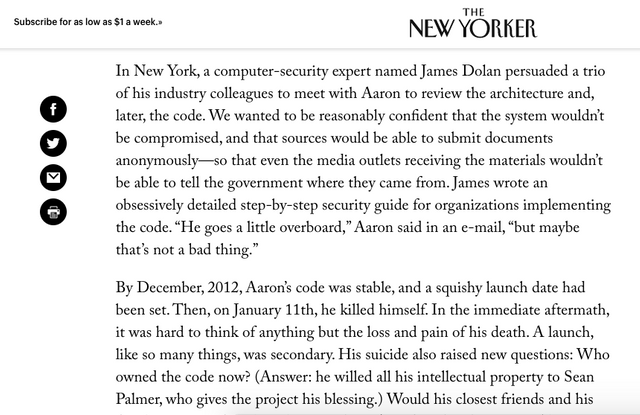
Unfortunately, the two main developers of SecureDrop, Aaron Swartz and James Dolan, are no longer with us. Both are said to have committed suicide. Aaron Swartz was memorialised in an obituary by Kevin Poulsen.
Poulsen is also an ex-Wired reporter and one-time Freedom of the Press Foundation technologist. The circumstances of his brief tenure at the organisation, or the reasons for his departure are unknown. His participation is memorialised only by a now-defunct Freedom of the Press staff listing.
More significantly, Poulsen is also the very reporter to whom FBI-snitch Adrian Lamo leaked the private chat logs of Chelsea Manning, leading to her capture and torture.
Lamo had presented himself to Manning as being both a journalist and of all things, a priest, and stated that Manning could therefore be doubly assured of the confidentiality of their communications. An unconscionable betrayal of trust.

Poulsen's partial reporting of the logs was lambasted by WikiLeaks, by Glenn Greenwald, and also by FireDogLake who analysed several different versions that found their way into the public sphere, and discovered major discrepancies.
Given these circumstances, one must marvel at the way Poulsen became a self-appointed gatekeeper of Aaron Swartz's legacy. Especially when he fails to acknowledge the most basic of facts about him: that Aaron was a very public advocate for WikiLeaks up until his death, and a WikiLeaks volunteer.
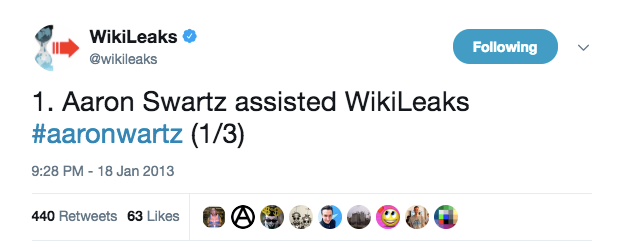
Rewriting History
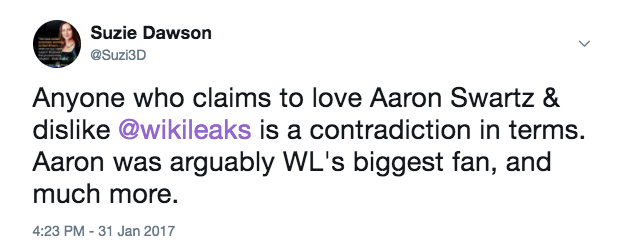
Like Poulsen, others who have survived Aaron Swartz make zero mention of WikiLeaks in their tributes to him.
Some actively deny the affiliation had any impact on Aaron's work at all: for example, Anil Dash.
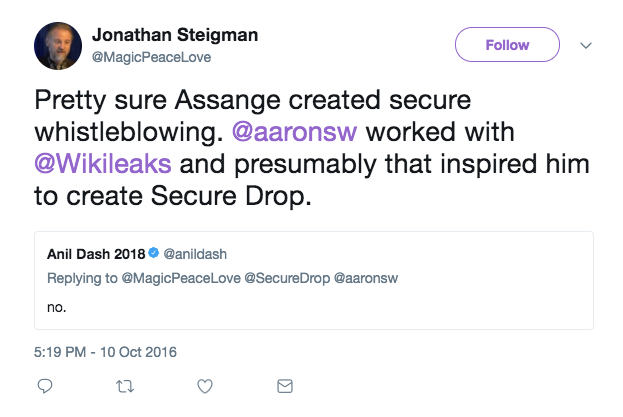
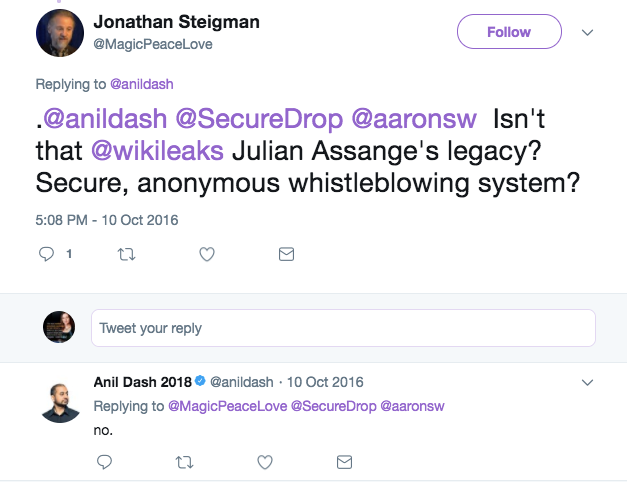
Those who put two and two together are swiftly directed towards Poulsen's "beautiful" obituary on Aaron, which irregardless of merit has come to serve as an official history.
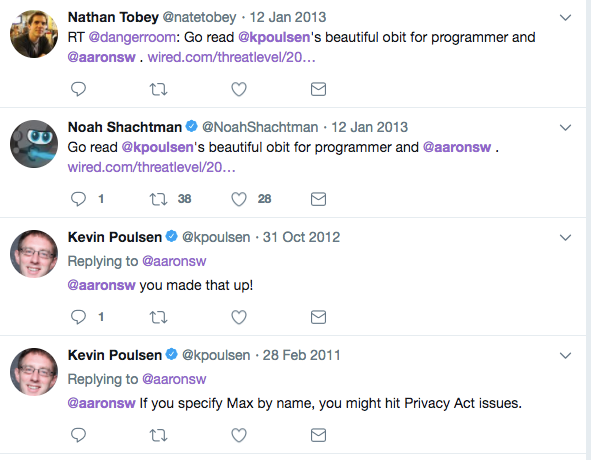
Conveniently, Poulsen's obituary of Swartz contains zero references to the whistleblowing organisation. (Poulsen has a long and acrimonious history with WikiLeaks, as the latter believes his tailoring of the Lamo-Manning chat log narratives involved a direct attempt to incriminate WikiLeaks by association.) Nor is there any mention of WikiLeaks in Cory Doctorow's Boing Boing obituary of Swartz.
The Guardian's obituary also omits the WikiLeaks connection. Likewise does Time Magazine's. Ditto, the LA Times, The Boston Globe, The Economist, The Telegraph and the New York Times.
All of the aforementioned placed the blame for Aaron's death solely on the stress arising from the DOJ investigation into Swartz's penetration of the JSTOR database at MIT. There is no mention whatsoever of any preceding status as a person of interest to the intelligence agencies targeting WikiLeaks.
Aaron appeared 13 times on RT, often engaging in outspoken public praise for WikiLeaks. Throughout the time period that the publisher was the subject of a worldwide manhunt and an "all of Government" investigation of "unprecedented scale and nature." This continually goes unmentioned.
Only Rolling Stone names WikiLeaks at all - and very briefly. "WikiLeaks claimed him as an ally", they wrote of Swartz. Yet it was Swartz who had repeatedly and profusely pronounced himself to be an ally of WikiLeaks, long prior to the JSTOR penetration that became the official reasoning for the relentless persecution of him by law enforcement authorities.
The net effect is not merely to render WikiLeaks irrelevant to the narrative retelling of Aaron's life - but to divert the spotlight from being shone upon the intelligence agencies that were hunting WikiLeaks staff and supporters around the world. The public is instead schooled to believe that the FBI's interest in him was all about the MIT case.
Public rage at Aaron Swartz's untimely passing was therefore directed at the university and the Department of Justice prosecutors, rather than the US intelligence community as a whole. The mainstream obliteration of Swartz's WikiLeaks connections conceals an important contributing factor in the circumstances leading up to his death.
I have confirmed with WikiLeaks that Aaron wasn't just a fan, a supporter, or a public advocate.
He was working directly with them.
But I already knew this, because of insights gained from yet another WikiLeaks volunteer, the significance of whose work and legacy is also being expunged from the public record. In this instance, while he is still alive.
Jacob Applebaum.
The Forgotten History
At the Aaron Swartz Day Hackathon in 2015, Jacob Applebaum gave vital testimony about his contact with Aaron, and their relationship with WikiLeaks. He spoke of a history that has been all but erased; the real reasons Aaron Swartz was an enemy of the State. Sure enough, it wasn't because he downloaded documents from JSTOR.
"Aaron and I worked on a few different overlapping projects and I very much respected him. Some of the topics that came up were light but some were very heavy and very serious. The topic of WikiLeaks was important to both of us. In November of 2009, long before I was public about my work with WikiLeaks, I introduced Aaron to someone at WikiLeaks who shall remain unnamed. If we had a secure, easy way to communicate, if some sort of communication system had existed that reduced or eliminated metadata, I probably could have done so without a trace. But we didn't. You're not the first to know - the FBI and the NSA already know. Less than a year later, Aaron sent me an email that made it clear how he felt. That email in its entirety is straightforward and his lack of encryption was intentional. On July 10th, 2010, he wrote "Just FYI - let me know if there's anything ever that I can do for WikiLeaks." Did that email cast Aaron as an enemy of the state? Did Aaron worry? 2010 was an extremely rough year. The US government against everyone - the investigation of everyone associated with WikiLeaks - stepped up. So many people in Boston were targeted that it was effectively impossible to find a lawyer without a conflict. Everyone was scared. A cold wave passed over everything and it was followed by hardened hearts for many... the sense of paranoia was overwhelming but prudent. The overbearing feeling of coming oppression was crushing... all of us felt that our days were numbered in some sense. Grand juries, looming indictments, threats, political blacklisting. None of us felt free to speak to one another about anything...
Shortly after Aaron was found WikiLeaks disclosed three facts: Aaron assisted WikiLeaks. Aaron communicated with Julian and others during 2010 and 2011. And Aaron may have even been a source. I do not believe that these issues are unrelated to Aaron's persecution and it is clear that the heavy-handed US prosecution pushed Aaron to take his own life. How sad that he was abandoned by so many in his time of need. Is it really the case that there was no link? Is it really the case that the US prosecutors went after Aaron so harshly because of a couple of Python scripts and some PDFs? No, clearly not...
When we learned more details about the US prosecutors, we learned that they considered Aaron a dangerous radical for unspecified reasons..." - Jacob ApplebaumAs well as the key revelation that Aaron offered his services to WikiLeaks, a mere one month prior to the commencement of the DoD manhunt, Jacob makes some other very important points.
Firstly: When considering all of this forgotten history, be it the Manning support, Aaron's work for WikiLeaks, WikiLeaks being the inspiration for SecureDrop, Julian Assange having been involved in founding the Freedom of the Press Foundation, (another fact denied by Micah Lee) or other related factors, one must understand that the FBI, the CIA and the NSA know full well the significance of WikiLeaks, their true legacy and their very real accomplishments.
That's why WikiLeaks and anyone associated with them are targeted. That is why the truth is obscured or outright expunged.
The public are subjected to this whitewashed historical record, to prevent them from discovering the full extent to which WikiLeaks deserves our praise and support. The true historical record exists within the databases of the intelligence agencies and is hoarded by the elite, who then seek to manufacture a new public reality.
Fast forward to the same Aaron Swartz Day event in 2017 and confirmed NSA XKeyscore and FBI target Jacob Appelbaum does not appear. He is now persona non grata, excommunicated from the activism community after being the subject of a sexual assault scandal that is eerily reminiscent of the accusations made against Julian Assange.
[*Author's Note: *.]
Part Fiveof Being Julian Assange will follow as soon as I have functional Steemit access! I hope you enjoyed this fourth taste of the full article.
Love,
Suzie
By Suzie Dawson
Twitter: @Suzi3D
Official Website: Suzi3d.com

Journalists who write truth pay a high price to do so. If you respect and value this work, please consider supporting Suzie’s efforts via credit card or Bitcoin donation at this link. Thank you!
Who is Suzie?
Read Suzie's Introduction On Steemit
Join Suzie's Steemit Club to upvote, share and support the work of top independent journalists on Steemit!
Glad the internet was finally cooperative, at least briefly!! :)
Suzie has asked me to mention here that there are a couple of incomplete or incorrect things in her notes for this article, that she was going to come back to, but when she tried Steemit was once again blocked in Moscow.
Вы очень хорошая журналистка! Удачи!
I'm getting the impression that Julian Assange is pretty much forgotten. Your series is breaking the silence, @suzi3d.